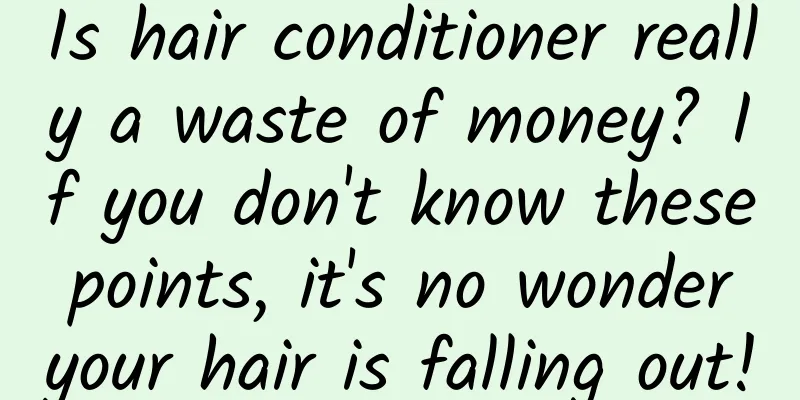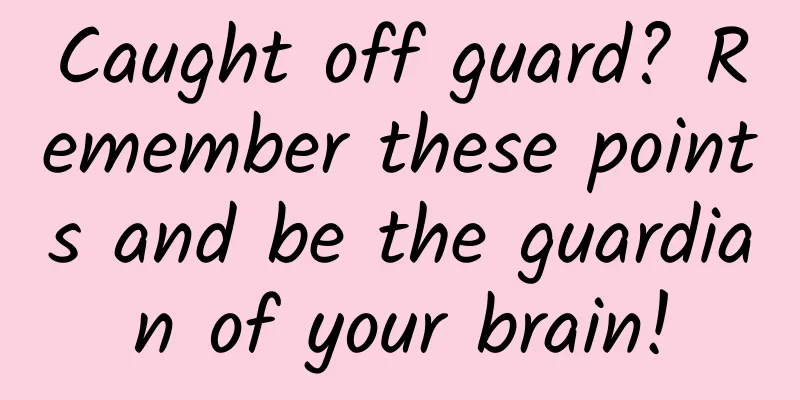Is hair conditioner really a waste of money? If you don't know these points, it's no wonder your hair is falling out!

|
Expert of this article: Han Hongyu, Associate Chief Physician, Department of Dermatology, Tangshan Nanhu Hospital Just ask yourself, who doesn’t want to have healthy and flowing long hair. However, the reality is that many people suffer from an unspoken pain - hair loss. Conditioner is an essential hair care product after shampooing. Some people say it is a waste of money. Does conditioner really work? How can we take care of our hair scientifically? Why does hair get oily all the time? The factors that affect the dryness and oiliness of human hair are determined by the secretion of oil by the sebaceous glands. The sebaceous glands are an important organ that produces lipids and has the effect of moisturizing the skin and hair and preventing dryness. The sebaceous glands of the scalp open at the top of the hair follicles and are mainly affected by androgen levels during their growth cycle. If the sebaceous glands secrete normally, the hair will be smooth and moisture loss will be avoided. The secretion of sebaceous glands varies due to climate, race, age, gender, etc. Excessive secretion can cause greasy hair, and if the sebaceous glands atrophy and produce less sebum, it can cause dry hair, dandruff, etc. The secretion is most active around the age of 16-35. In summer, the secretion is more, and the hair tends to be greasy. In autumn and winter, the secretion is less, and the hair is dry. Eating too much greasy, spicy and stimulating food can also increase secretion. Increased androgen levels and hypertrophy of sebaceous glands can also cause increased glandular secretion. Therefore, controlling the secretion of sebaceous glands is critical. Why does hair loss occur? The hair growth cycle can be divided into the growth phase, the regression phase, and the resting phase. Hair does not grow or fall out at the same time. About 80% of all hair is in the growth phase. It is normal to lose 70-100 hairs every day, and the same amount of hair regenerates at the same time. Hair in the growth phase does not fall off easily. When the hair follicles enter the resting phase, the hair bulbs gradually shrink and the hair becomes easy to fall out. Pulling the hair when combing or using too much force when washing can cause hair loss. As we age, the body's functions decline, the hair follicles gradually shrink, causing hair loss. Hair loss can be clinically divided into physiological alopecia and pathological alopecia. Physiological hair loss is also called telogen effluvium. For example, strong mental stimulation can increase the number of hair follicles entering the telogen phase from the growth phase, and a large amount of hair will fall out in a short period of time. When mental stress is gradually reduced, the telogen follicles will enter the growth phase again. High fever, malnutrition, excessive blood loss, shock, and abnormal living habits can all cause telogen effluvium, which usually recovers two months after the relevant factors are removed. Postpartum hair loss is a type of telogen effluvium, which usually occurs 1-4 months after delivery. The duration of hair loss usually does not exceed 6 months, and for some mothers it may exceed one year. In addition, some hair loss is pathological, such as the common "alopecia areata", where a patch of hair falls out suddenly. This type of hair loss is medically called alopecia areata, which is caused by immune dysfunction. In the past, we often called it seborrheic alopecia, which is now called androgenic alopecia. Most of the causes are related to genetics, and both men and women can suffer from the disease. It is mainly caused by the strong secretion of androgen, which causes the sebaceous glands of the scalp to become active and the oil secretion to increase, thus causing hair loss. The large amount of hair loss in cancer patients is a kind of hair loss during the growth period, which is mostly caused by the use of drugs. Many drugs can also cause hair loss. In addition, some rheumatism, immunity, endocrine, and infection diseases can cause hair loss. Is conditioner a waste of money? Conditioners are commonly used in daily shampooing, but can conditioners really protect hair? Is it just a waste of money? Or is it really useful? First, let's look at the main ingredients of the conditioner, which are composed of various surfactants, oils, cationic conditioning agents, and other active ingredients. They can be adsorbed on the hair to reduce the accumulation of static electricity and prevent hair from floating; adding conditioning agents and chelating agents makes the hair smooth, shiny, and easy to comb, and repairs the hair damaged by perming, dyeing, and other reasons to a certain extent. Who is hair conditioner more suitable for? It must be people with long flowing hair, especially those whose hair is damaged by frequent perming and dyeing, or those whose hair is dry and tangled easily. It is recommended to use hair conditioner to repair and moisturize the hair. For people with short hair or good hair quality, it doesn't matter whether to use hair conditioner or not. How to use conditioner? After shampooing, gently dry your hair and apply it evenly on the ends of your hair, especially on dry, split and damaged hair. Avoid applying it on the roots of your hair as the roots of your hair secrete more oil and do not require additional care. After applying the conditioner, keep it on your hair for 2-3 minutes to allow the conditioner to work better. For dry, tangled, and difficult-to-manage hair, use conditioner before washing your hair, and be sure to rinse it thoroughly after using conditioner. How to care for your hair? Who doesn't want to have long, black, beautiful hair? How can you wash and maintain it on a daily basis? Follow these tips to keep your hair healthy and flowing. 1. Shampoo Choose shampoo and conditioner that suits your hair type, and control the frequency of washing your hair. For dry hair, wash it every 3 days, for oily hair, wash it every day, and for neutral hair, wash it every other day. Be gentle to your hair, wipe it with a soft towel, and use a hair dryer as little as possible, as it can cause some damage to your hair. 2. Keep combing your hair Wooden or bone combs can reduce static electricity. Regular combing can make hair soft and smooth, keep hair clean, and increase blood circulation in the scalp. 3. Scalp massage Gently tap your scalp with the fingertips of both hands for 3 minutes, several times a day, to promote blood circulation in the scalp and reduce hair loss. 4. Reduce perming and dyeing, and trim hair ends frequently Perming should be done no more than twice a year. When the hair quality is poor, you need to focus on maintenance. It is best to have a haircut once a month. Frequent haircuts can stimulate hair growth. 5. Diet Avoid spicy, sweet, and greasy foods, eat a light diet, and keep your bowels open. Eat more fruits and vegetables. Foods rich in vitamins B and C can improve hair quality and promote nutrient absorption and growth. Hair care requires good methods and good habits. A beautiful appearance starts from the beginning. The pictures in this article with the "Science Popularization China" watermark are all from the copyright gallery. The pictures are not authorized for reprinting. |
Recommend
The Samsung phone that even Do Min Joon can’t save
When Samsung mobile phones were frequently expose...
You can get in just by paying! APP Promotion Offline Pre-installation Promotion Manual
1. What is App pre-installation promotion? Pre-in...
Lost "Life": Reflections on the significance of scientific and technological progress
With the advancement of science and technology, e...
Will milk tea be classified into nutritional levels? Which level of milk tea is healthy?
According to recent media reports, Shanghai has p...
What is this saltwater fish that has a strange appearance, a difficult name to write, and is difficult to tell male from female?
The brindle fish, commonly known as "butterf...
Elements and channels of product promotion plan!
The general promotion process is as follows: 1. M...
Ten techniques to teach you how to create a "10w+" title
This is an era of "information explosion&quo...
Sohu wins 2014 World Cup video rights, portal + video creates differentiated services
On May 7, Sohu announced a partnership with CNTV,...
Is the FOTILE refrigeration hood and cooking center, which costs 28,980 yuan, leading a real trend or creating false demand?
On the evening of August 12, Fotile, a veteran co...
How can you socialize if you don’t follow hot topics?
There is an interesting phenomenon in the marketi...
Weibo has officially launched the V+ membership service. How is it operated and promoted?
On November 8, Weibo officially launched the V+ m...
"In-depth Unveiling of the Algorithmic Rules for Popularity on Douyin Short Videos" will help you take a step forward in the shortcut of Douyin operation and monetization
"In-depth Unveiling of the Algorithmic Rules...
Live broadcast training camp: Create a million-dollar live broadcast room to teach you how to sell goods through live broadcast and seize the live broadcast boom
In order to help companies quickly cultivate live...
China Association of Automobile Manufacturers: Brief analysis of passenger car production and sales in October 2021
According to statistics and analysis by the China...
Here are all the expectations for Apple's March 9 event
Apple on Thursday sent out invitations to the med...









